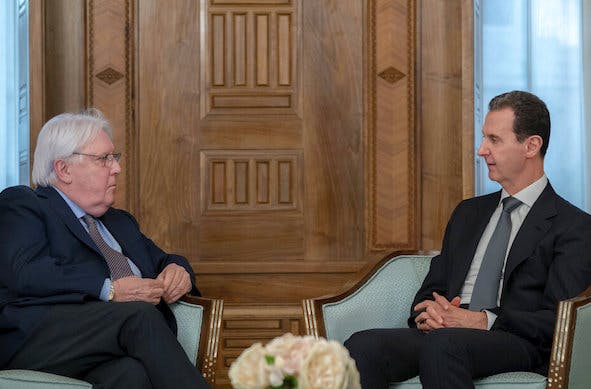Syria Earthquake Provides Opening for Rehabilitation of Butcher of Damascus
Yet as the West and even the Arab world pay ‘lip service to Assad following the earthquake, they are yet to strategically change the policies that have ostracized him.’

As president of Syria, Bashar Assad has presided over a decade-long war that has killed 600,000 of his own countrymen. With regional and world leaders now rushing to Syria’s aid in the wake of an earthquake in which some 5,000 people died, will the Butcher of Damascus be rehabilitated?
President Biden seems to have somewhat overcome America’s long abhorrence of the Syrian dictator. On February 9, the Department of the Treasury issued a six-month exemption to sanctions that previously had banned transactions with any regime-tied institutions. Although temporary, the exemption allows earthquake-related aid to go through institutions, including those controlled by the Syrian government.
While American aid is delivered directly to hard-hit northern Syria, rather than through areas controlled by the Syrian army, Treasury’s new “license” could be seen at Damascus as a signal that Mr. Assad’s global isolation is gradually being eased.
The exemption “created a sanctions loophole that the Assad regime and its Iranian and Russian patrons will no doubt exploit, as they have every other loophole discovered throughout the war,” a Syria watcher at the Washington Institute, Andrew Tabler, wrote recently. The regime’s ties to terrorist groups like Hezbollah “raise further concerns about broadly enabling transactions in this manner,” he added.
Yet, as the West — and even more so the Arab world — “pays lip service to Assad following the earthquake, they are yet to strategically change the policies that have ostracized him,” a veteran Syria watcher and director of the Moshe Dayan center at Tel Aviv University, Eyal Zisser, told the Sun.
“They’ve been saying Assad is being rehabilitated since 2017, 2018, when the war reached an impasse,” Mr. Zisser says. “It may happen one day, but for now, despite several signs pointing otherwise, rehabilitation is not happening.”
Although tenuous, a budding Arab rapprochement has nevertheless been accelerated since the February 6 earthquake. Leading the charge is the United Arab Emirates, which to date has pledged $50 million to quake victims.
Abu Dhabi has led Arab states in signaling readiness to return the Assad regime to the fold. In 2018 the UAE became the first country to reopen an embassy at Damascus since the Arab League severed ties with Syria shortly after the 2011 start of the war.
By now the Emiratis are far from alone. The Jordanian foreign minister, Ayman Safadi, visited Damascus recently for the first time in a decade. Egypt’s president called Mr. Assad this week after the two have long shunned each other. On Monday Mr. Assad traveled to Oman — a first visit there.
Saudi Arabia, a leading regional power, by and large has shunned attempts at rehabilitating an ally of its top regional rival, Iran. Yet, after at first sending earthquake aid to Syria through the Turkish border, this week even Riyadh started flying humanitarian goods directly to the regime-controlled airport at Aleppo.
Mr. Assad has long limited foreign access to areas of the country near the Turkish border, which were hardest hit by the earthquake. These regions are controlled by several factions, including ISIS and American-backed Kurdish militia that combats the Islamists.
For years the United Nations used to deliver humanitarian aid to northern Syria through four crossings. Using his Russian allies’ Security Council veto power, Mr. Assad in the last few years blocked aid deliveries through those crossings, except for one, at Bab al-Hawa.
Last week Mr. Assad’s ambassador at the UN, Bassam Sabbagh, announced that Syria now “supports the entry of humanitarian aid into the region through all possible crossings.” Although the opening was limited to a three-months period, the announcement was meant to project Mr. Assad as a leader who cares about all Syrians.
Mr. Zisser argues that such gestures, both on the Syrian side and from the outside world, amount to little. Despite aid to quake victims, the Syrian currency is fast losing value, and all the phone conversations and presidential visits have yielded zero substantive agreements.
Yet, Mr. Assad’s top regional ally, Tehran, seems intent on utilizing the crisis for furthering its regional goals. On February 8, the commander of the Quds Force arm of the Islamic Revolutionary Guards Corps, Esmail Qaani, landed at Aleppo for a four-day visit, which reportedly included a meeting with Mr. Assad, according to the Meir Amit Intelligence and Terrorism Center.
Mr. Qaani’s visit was officially designed to coordinate Iranian aid deliveries. Yet the Quds force was established by the IRGC not as a humanitarian group, but one charged with violently exporting the Iranian revolution to the region and beyond. Mr. Qaani reportedly participated in a meeting with representatives of Syrian intelligence and Hezbollah higher-ups, where new deliveries of missiles and other arms were planned.
Last Saturday he reportedly left Syria shortly prior to an air attack on a Damascus neighborhood. The hit, widely ascribed to Israel, was the first such action in Syria since the earthquake. It signaled that, the humanitarian disaster aside, Jerusalem will stop deliveries of Iranian arms that endanger Israel under the guise of humanitarian aid.

